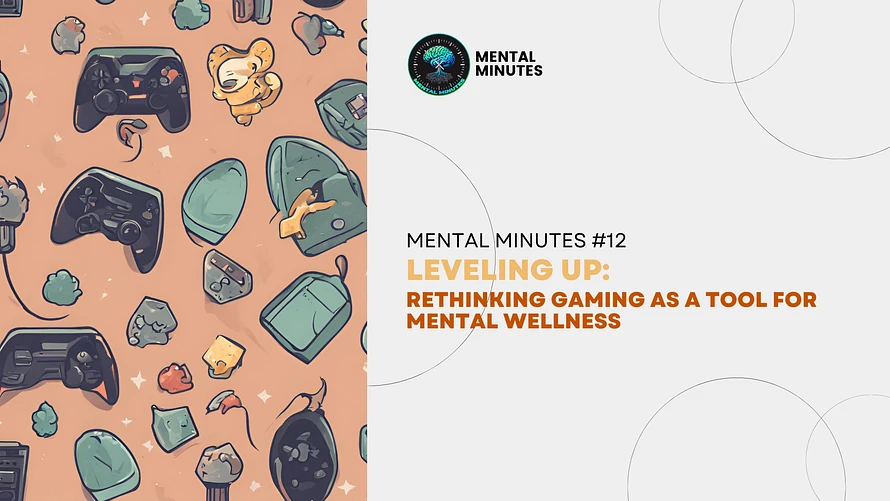Leveling Up: Rethinking Gaming as a Tool for Mental Wellness
In the world of gaming, where fantastical adventures and epic battles reign supreme, there lies a hidden power beyond mere entertainment. As the gaming landscape evolves, so too does our understanding of its potential to positively impact mental wellness. Far from being just a pastime, gaming has emerged as a potent tool in addressing a myriad of mental health challenges. Let’s embark on a journey through the digital realm, exploring how gaming can be a catalyst for personal growth and mental well-being.
The Healing Power of Gaming
- Stress Relief: In the hustle and bustle of modern life, stress is a constant companion for many. Yet, stepping into a virtual world can offer much-needed respite. According to a study published in the journal Computers in Human Behavior, 55% of gamers play video games as a means of stress relief. Whether it's slaying dragons or solving puzzles, gaming provides a temporary escape from the pressures of reality.
- Anxiety Management: For those grappling with anxiety disorders, navigating everyday situations can feel like traversing a minefield of triggers. However, gaming offers a safe space for gradual exposure therapy. Research from the American Psychological Association suggests that certain video games, particularly those involving relaxation and problem-solving elements, can help reduce anxiety levels.
- Social Connection: Contrary to the stereotype of solitary gamers huddled in dark rooms, gaming fosters social bonds that transcend geographical boundaries. Online multiplayer games serve as virtual gathering places where friendships are forged and camaraderie flourishes. According to a report by the Entertainment Software Association, 70% of gamers play with friends, whether online or in-person, enhancing their sense of belonging and social support.
- Cognitive Enhancement: The mental gymnastics required to conquer gaming challenges can give your brain a serious workout. From strategic planning to quick decision-making, gaming stimulates cognitive functions that are crucial for maintaining mental acuity. A study published in PLOS ONE found that playing certain video games can improve cognitive flexibility, attention span, and spatial memory in older adults.
- Empathy Development: Stepping into the shoes of diverse characters and navigating their experiences can foster empathy and perspective-taking skills. Research conducted at the University of Wisconsin-Madison suggests that playing narrative-driven video games can lead to increased empathy and prosocial behavior in players.
- Mood Regulation: Just as a favorite book or movie can lift your spirits on a gloomy day, gaming has the power to uplift mood and instill a sense of accomplishment. According to a survey by the University of Oxford, 84% of gamers reported feeling relaxed or happy after playing video games. Engaging in enjoyable activities, such as gaming, releases feel-good neurotransmitters like dopamine, providing a natural mood boost.
- Self-Expression: In virtual worlds limited only by imagination, gamers can freely express themselves without fear of judgment or repercussions. Character customization options and player-driven narratives empower individuals to craft their identities and explore aspects of themselves they may not reveal in real life. This self-expression can be particularly beneficial for those struggling with identity issues or low self-esteem.
- Community Support: Gaming communities offer more than just a platform for gameplay; they serve as havens of understanding and support for individuals facing mental health challenges. From online forums to live-streaming platforms, gamers come together to share their experiences, offer advice, and provide encouragement to those in need. The sense of belonging and solidarity within these communities can be a lifeline for individuals struggling with loneliness or isolation.
Embracing the Potential
As we navigate the complexities of mental health in an increasingly digital world, it's time to acknowledge the transformative potential of gaming. Far from being a mere indulgence, gaming can be a powerful tool for promoting mental wellness and resilience. By harnessing the immersive nature of virtual worlds, we can unlock new avenues for self-discovery, social connection, and personal growth.
So, the next time you pick up a controller or launch your favorite game, remember that you're not just embarking on a digital adventure – you're taking a step towards nurturing your mental well-being.
Sources:
- Computers in Human Behavior
- American Psychological Association
- Entertainment Software Association
- PLOS ONE
- University of Wisconsin-Madison
- University of Oxford
